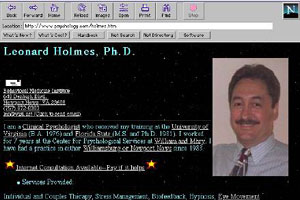
Web can be a link to your shrink

Clinical psychologist David Sommers offers advice online.
|

Leonard Holmes asks patients he counsels online to send a check if they feel he has helped.
|

Theres no appointment needed at David Sommers Mental Health Cyber-Clinic. Clients can send e-mail to the Kensington, Md., psychologist day or night. Within 24 hours, hell respond.
He says what he offers is not therapy. "A lot of what I do is just provide information and help people feel less alone," Sommers says.
His site is one of more than 50 now offering psychological help on the Internet, either for free or for a fee.
Tips from an online counselor
Consumers considering buying online psychological services should be aware of many factors, says Dr. John Grohol, who is also founder and CEO of mental health information at Psych Central, which offers free resources at http://psychcentral.com/.
Therapist identity: Look for sites that clearly identify whos providing the services. This should include a name, credentials and an address or phone number. Be wary of therapists who charge but wish to remain anonymous. If you have a question about credentials, verify the information with the state where the person claims to be licensed.
Fees: Check out the details of the services provided before committing. "Some of the prices and some of the services are not necessarily clear," he says.
Payment: "Its amazing how many therapists offer services without being aware of the security problems on the Web," Grohol says. He says generally, credit card information should not be given out online or on the Web. To be completely safe if paying by credit card, Grohol suggests calling the therapist and giving the number over the phone. Also, remember there are some professionals who offer free information and advice.
Security/privacy: Consumers who worry about e-mail being read by others should try to find a therapist who uses encryption, a process that ensures only the person to whom the e-mail is sent can read it. And be careful about e-mailing from work, Grohol warns: "At larger corporations the policy is to monitor e-mail, so it could be read by an employer."
|
Some label the sites high-tech versions of talk radio. Others call them powerful tools for information seekers, especially those with limited incomes or in isolation. But consumers seeking advice, whether about a first date or a failing marriage, should navigate with caution, experts say.
"These sites are best for problems in living, difficulties the average person might encounter," says Dr. John Grohol, a professional hosts a free live chat at his Psych Central website (http://forums.psychcentral.com/) 9 p.m.-10:00 p.m. ET every Tuesday night.
"I think it best serves people who need to fill in the cracks," Grohol says. "It can be a great adjunct to regular therapy or a support group."
Like the professionals who run them, these sites have distinct personalities. Some providers offer longer-term contact with clients. Sommers has gotten questions from more than 100 people at http://www.dcez.com/~davids. Topics have ranged from relationships to self-injury. "What Im interested in is having people engage in an ongoing dialogue and establishing a therapeutic alliance."
His fees range from $10 for one e-mail to $100 for a month of e-mail exchanges. But Sommers does a lot of work pro bono. So far he has made only about $300.
Other services, like New York-based Shrink-Link (http://www.westnet.com/shrink/), prefer single-question contact with clients. Shrink-Link has five psychologists whose specialties include substance abuse and womens issues. They charge $20 for one 250-word question and answer it in 72 hours.
"Were kind of like an online Ann Landers," says participating psychologist Dorothy Litwin.
Leonard Holmes, a psychologist in Newport News, Va. (http://www.psychology.com/holmes.htm), charges $1.50 a minute to answer one question, which usually takes about 15 minutes. "I ask people to pay me only if they feel theyve received some benefit from it." About half pay, he says.
Like Sommers, he doesnt consider it therapy.
"Its important not to do more than you can on the Internet, and right now I dont think its possible to do therapy. There can be problems if you treat it like a therapeutic relationship and youre miles and miles away."
Because there are no standardized guidelines for therapy via the Net, some worry that therapists could get in over their heads.
"There are some questions left unanswered about what happens if something goes terribly wrong, like suicide," Grohol says. "What is the responsibility of the therapist?"
Adds San Diego psychologist Marlene Maheu: "If I get one paragraph from you, its very hard to assess whats going on. When youre sitting face to face, it can often take a long time to get the whole picture."
She was part of an American Psychological Association task force that discussed the topic in December. So far, no formal conclusions have been reached.
Maheus own online magazine, Self-Help & Psychology, features a column that answers composite questions from readers with no names attached.
"People can get advice, but the impact of the one-on-one relationship is not there," she says.
All the major online services also offer information to subscribers, plus a full range of peer support groups on psychological issues.
"Theres a huge pent-up demand for mental health information and support," says Stephenson Bond, director of Online Psych at America Online (AOL). "For people who arent able to find support in their own communities, in the online world its just a click away."
So far AOL doesnt offer one-on-one psychological counseling or provide links to anyone who charges a fee for advice.
"There really hasnt been any research to establish whether online counseling is effective. Its going to take time for the government to digest what the medium is all about and then make a ruling thats going to protect consumers," Bond says.
Psychologists realize theres a human element to being in the same room with a client that computers cant replace. But as video technology improves, many say it will be possible someday to practice on the Net. For now, clients say advice they get online does help.
Martha Ainsworth, a New Jersey telecommunications consultant who teaches people how to communicate on the Internet, has worked with an online therapist. When she travels, as long as her laptop is with her, she can have a cyber-consultation.
"In a way its like keeping a journal," she says. "I can explore my thoughts and feelings in great depth - take as much time as I want and write as much as I want. But its different from a journal in that a trained professional is reading it. And when you keep a journal, it doesnt talk back to you."
Ainsworth has faith in the power of the Net as a tool for psychological guidance. She has compiled a list of online psychological providers at http://www.metanoia.org/imhs/, her own Web site.
"This does not replace face-to-face therapy - it never will," she says. "That doesnt mean its not a good thing. Its an additional thing. It doesnt have the same rules, but it can be helpful."
By Diana McKeon Charkalis, USA TODAY
Reprinted with permission

